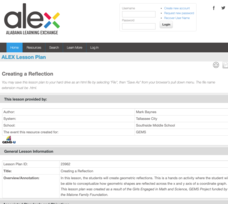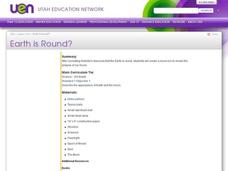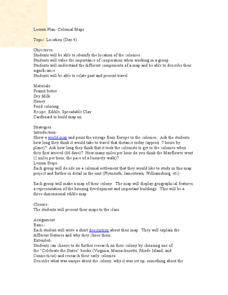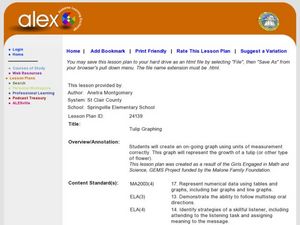University of Colorado
Are All Asteroids' Surfaces the Same Age?
Did you know scientists can tell the age of an asteroid by looking closely at its craters? This final lesson of a six-part series focuses on two asteroids, Gaspra and Ida, in order to demonstrate the concept of dating asteroids. Scholars...
Curated OER
Pythagorean Theorem: Triangles and Their Sides
Students investigate triangles and their relationship to each other. In this geometry lesson, students solve right triangles using the properties of the Pythagorean Theorem. They differentiate between right, acute, straight and oblique...
Curated OER
Data Collection and Presentation
Students concentrate on discrete quantiative data. They are shown that the vertical line diagram as a more appropriate way to present discrete quantiative data then bar charts. Students work as a group to help with the interpretation...
Curated OER
Probability Of One Event
Students investigate the concept of probability. They use example problems in order to measure the likelihood of various outcomes. The lesson includes dialogue to be used by the teacher during direct instruction. They also use class...
Curated OER
Scavenger Hunt for Coins of the World--New Zealand, Japan and France!
Students explore the history, culture and currency of the countries they "visit" using the US Mint Coins of the World activity. Students find the answers to a Scavenger Hunt Questions handout for the country being studied. Students...
Alabama Learning Exchange
Poppin' For Popcorn!
Students graph data from different popcorn flavors. For this graphing lesson, students make graphs using an assigned web site after collecting data about the flavors of popcorn that fellow classmates prefer.
Alabama Learning Exchange
Creating a Reflection
Investigate geometric reflections in this geometry lesson. Create geometric reflections that show the reflection across the x and y axis of a coordinate graph. Learners watch a teacher demonstration before proceeding on their own. They...
Curated OER
Equations Lesson Plan
Seventh graders play "What's my Rule" beginning with simple equations and working towards harder problems as student's gain confidence. They evaluate the equations by graphing them. Students identify the slope and y intercepts of the...
Curated OER
Buzzy, Buzzy Bee
Students simulate honeybees pollinating flowers. In this pollination lesson, students role-play the process of pollination over the course of several seasons. Students graph results and share their graphs with the class.
Curated OER
Earth is Round?
Third graders discuss how Aristotle concluded that the Earth was round. As a class, they review theories about the Earth's shape and describe how life on Earth would be different if it were flat. Individually, they make a moon book in...
Curated OER
Rings Around the Racetrack
Students determine the number of laps a driver would need to complete the Indy 500. They calculate the length of time it would take to complete the race at different rates of speed.
Curated OER
Problem Solving Techniques
Young scholars develop a pattern for problem solving. They gain confidence in their ability to solve problems and are introduced to mathematics help online.
Curated OER
Beyond the Earth Part II
Learners explore the solar system. In this solar system lesson, students use Internet and print resources to research a component of the solar system. Learners create travel brochures based on their research findings.
Curated OER
Colonial Maps
Students discover the history of America by identifying the traditional colonies. In this U.S. history lesson, students examine a world map and identify where the voyagers left from Europe to arrive at the United States. ...
Curated OER
Highway Design for the Future
Eighth graders research highway designs and create a marble maze to illustrate a highway system. They test their designs and write reports defining the project and analyzing the results.
Curated OER
A Tour of Rome Fit for an Emperor
Learners travel to Rome. In this geography skills activity, students explore famous places in Rome with Google Earth tools. Learners research the city of Rome and create touring brochures of the city from the perspectives of past...
Curated OER
The Starry Night Time and Day Time
Second graders complete a unit of lessons on the solar system. They complete various art projects inspired by Van Gogh's 'Starry Night,' create a moon phases book, create a moon phase wind chime, develop a timeline of space exploration,...
Curated OER
Tropical Atlantic Aerosols
Students analyze NASA data from the Multi-angle Imaging Spectroradiometer. In this NASA data lesson, students access an assigned website to examine information from the MISR on the Terra Satellite. They determine how desert dust travels...
Curated OER
The Ultimate Vacation
Students use research skills to solve a problem. They research information needed to plan a vacation. Students create a letter, a flyer, an itinerary, an activity list, cost spreadsheet, a reference page, table of contents and a title page.
Curated OER
Tulip Graphing
Students create a graph of tulip growth. In this data analysis lesson, students plant tulip bulbs and use graph paper to begin graphing data on the growth of the tulip.
Curated OER
Trundle Wheel
Sixth graders explore the uses of a trundle wheel. In this units of measurement lesson, 6th graders use trundle wheels to measure distances.
Curated OER
Utah History & Geography
Fourth graders calculate and determine the distances between counties in Utah. Using a map of Utah, they determine the distance between three county seats, the total distance round trip, and label a map with the distances.
Curated OER
Sketching Cylinders
Students create nets of cylinders. In this geometry lesson, students calculate the surface area of cylinders and other solids. They show their understanding of three-dimensional shapes by solving problems.
Curated OER
Daily Life in the Fur Trade: Communications & Resourcefulness
Student complete a number of activities using computer based resources and primary sources to research the fur trade. They answer questions using the computer research.























